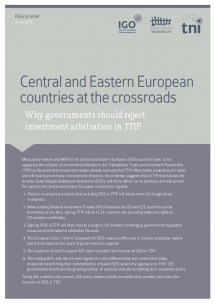Central and Eastern European countries at the crossroads Why governments should reject investment arbitration in TTIP
Central and Eastern European (CEE) countries find themselves at a crossroad regarding their investment protection policies with the US. This briefing provides evidence that shows that including investment arbitration in the Transatlantic Trade and Investment Partnership (TTIP) will worsen the capacity for CEE governments to regulate.

Authors
Most policy-makers and MEPs from Central and Eastern European (CEE) countries have, so far, supported the inclusion of investment arbitration in the Transatlantic Trade and Investment Partnership (TTIP) on the basis that investment treaties already exist and that TTIP offers better protections for states and will lead to an increase in investment. However, the evidence suggests that a TTIP that includes the Investor-State Dispute Settlement mechanism (ISDS), will fail to deliver on its promises and will worsen the capacity for Central and Eastern European countries to regulate:
- There is no empirical evidence that including ISDS in TTIP will attract more US foreign direct investment.
- While existing Bilateral Investment Treaties (BITs) between the US and CEE countries can be terminated at any time, signing TTIP will lock CEE countries into providing extensive rights to US investors indefinitely.
- Signing ISDS in TTIP will likely lead to a surge in US investors challenging governments regulatory measures at international arbitration tribunals.
- The European Union “reform” proposals for ISDS make no difference in investor protection regime and will not improve the space of governments to regulate.
- The existence of intra-European BITs does not justify the inclusion of ISDS in TTIP.
- The existing BITs with the US were signed at a very different time and context than today. Instead of reconfirming their commitment to a flawed ISDS system by signing on to TTIP, CEE governments should join the growing number of countries that are re-thinking their investment policy.
Taking this evidence into account, CEE policy makers should reconsider their position, and reject the inclusion of ISDS in TTIP.
Conclusion and recommendations
Governments currently have the opportunity to terminate their BITs with the US at any time, and keep control over their investment protection policy framework. The policy freedom that CEE countries presently have would be severely limited with TTIP. In addition, ISDS has come under increased international scrutiny.
Central and Eastern European countries find themselves at a crossroad regarding their investment policies with the US. One road will lead to a set of rules cast in iron that will be hard to escape and offer no improvement over the current system. In fact, it is very likely to put governments in a worse off position than the current situation. The alternative route, rejecting the inclusion of ISDS in TTIP and considering terminating their current BITs, will provide Central and Eastern Europe the possibility to regain control of their policy space to regulate and free themselves of the continuous risk of being sued for millions of euros by disgruntled investors. The concern over the cost of investment arbitration and its impact on state budgets becomes even more relevant in the current context of economic crises and austerity.
In light of the evidence, it would be wise for Central and Eastern European governments and MEPs to reconsider their position and reject the inclusion of ISDS in TTIP.



